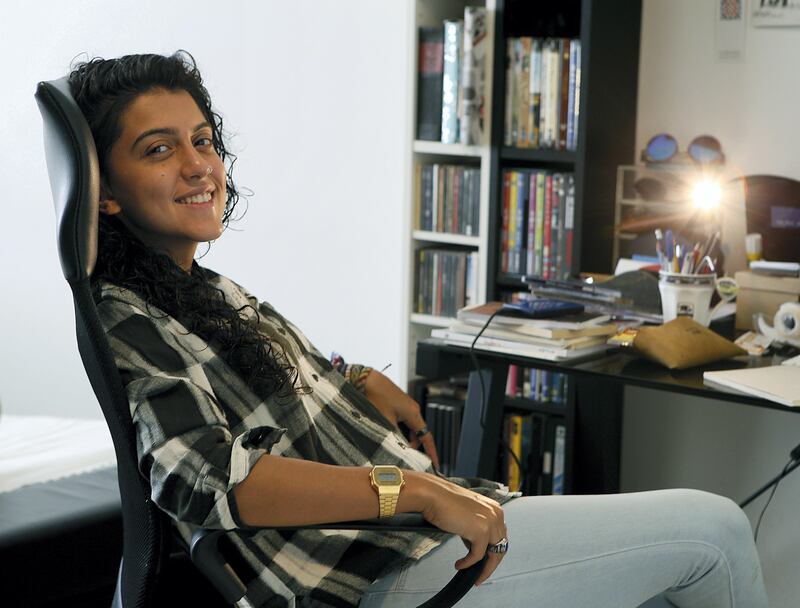Farah Chamma is excited about her performance in Dubai this weekend, and has to hold herself back from revealing too much of what to expect on the day.
Despite her youth, the 23-year-old Dubai-born Palestinian has become a recognisable name on the local performance circuit when it comes to performance poetry and spoken word. On Saturday afternoon, she will be teaming up with members of the band Parea for an energy-filled improvisation session.
Chamma will perform her spoken-word texts in English, Arabic, Spanish and French, accompanied by the band – percussionist Myriam Nehmeh, with oud and guitar player Maruan Betawi – who will not have any prior knowledge of Chamma's text. The hope is that instead of clashing, the result will be an impromptu, collaborative performance that makes sense.
"We never rehearse what we will be performing," says the Sharjah resident. Two years ago, she met the members of the band and became open to the idea of mixing in musical improvisation with her spoken-word performances, and she started getting together with Parea twice a month for "jamming sessions".
"The musicians would start playing, jamming together, and I would just start speaking, whether a text I already have or one I'm writing on the spot," she says. "Or I might tell them I'm angry, I want angry music, and they start playing based on what I ask. And what's extraordinary is it would just always work, and turn out so synchronised. It would amaze me because we hadn't rehearsed."
Whether speaking about the jamming sessions that have kept her going for the past few years, the high she gets from writing the spoken texts she lives to perform or telling of her journey from a 12-year-old teenager dabbling in writing poetry to a young woman who has travelled to more than 15 countries performing her slam poetry, Chamma is passionate about doing what she loves.
"I've always known that I like to express myself through words," she says. "Words are my best medium, and I'm comfortable writing in English, Arabic and French, and have performed in all these languages." She also speaks Portuguese, German and Spanish, and writes poetry in all six languages.
But written and spoken poetry – both of her outputs – are very different, Chamma insists. Written poetry, she maintains, is not meant for the stage.
"It's not engaging; it's for introspective reading. But when I'm writing a stage text, I know there will be an audience, so I am aware of who and when – I like to adapt my text for the space. The text itself is also more malleable, because things might change on stage.
"I might add new lines, change the structure, just flow with it. The way the text is said could change with the vibe of the audience."
But even with an audience of one, Chamma is raw and visceral when she performs; her energy is palpable.
Where once she wrote about her Palestinian identity, her feelings of displacement and her struggle with nationality – her poems The Nationality, I Am No Palestinian and How Must I Believe? are her most-viewed YouTube uploads – Chamma has recently branched out to write about everything from job hunting to smoking shisha.
"I have changed, and my writing changes with me. I try to write about different things now," she explains. "I have a flight-attendant announcement that I do in three different languages, where what's being said is very unexpected to the audience and goes beyond: 'Fasten your seat belts.' It's a bit of a comical piece. I like to mock; I like to hear laughter when I'm performing. I still tackle serious subjects, but my inspiration comes from life, and I have to be true to that."
Falling into the trap of only ever writing about Palestine, about identity and struggle, about the big causes of the world, can backfire, she says. "Write about what you're actually feeling, what you're living, whatever that may be," she reasons. "It's all emotion."
What Chamma does is more than a performance. She tells a story, engages her audience and expresses herself while entertaining and moving her listeners. Sometimes, the show becomes interactive.
Presenting her work in Arabic is important to her, too. She says that very few slam poets perform in Arabic, and women doing so are even rarer.
_________________
Read more:
Farah Chamma selects her favourite peers and gives advice on creating poetry
[ Literaturhaus at Nadi marks a Dubai salon revival ]
[ Sharing a lifelong love of reading with your child ]
[ Poetry slam and music in celebration of National Day ]
_________________
"I have not met any girl until today that does spoken word in Arabic," she says.
"There are female Arab poets, but few who do spoken word in Arabic. This is close to my heart, so I've been searching. I've found Terez Sliman in Palestine and two – Michelle and Noel Keserwany – in Lebanon. That's it."
Two years ago, Chamma graduated from Paris-Sorbonne University Abu Dhabi with a degree in philosophy and sociology, and she has since been teaching Spanish at a school in Dubai. She has been accepted to study a master's in performance and culture at Goldsmiths, University of London, but had to defer for a year while she raises funds, via a crowdfunding campaign, to pay her tuition fees.
I just have to remind myself to never give up," she says. "I know what I want to do. And I know I'll always be doing it. Performing what I write is the most exciting element in my life; it's not just a hobby. It's my source of energy."
Farah Chamma and Parea perform at Literaturhaus at Nadi, at Nadi Al Quoz, Alserkal Avenue, Dubai, on Saturday, from 4pm. The event is free, but pre-booking is advise by emailing rsvp@alserkalavenue.ae





